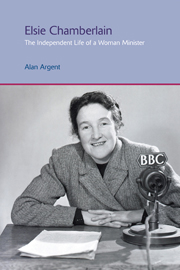Book contents
- Frontmatter
- Dedication
- Contents
- List of Illustrations
- Acknowledgements
- 1 Introduction and Early Life
- 2 The Call to the Ministry
- 3 Elsie Begins Her Ministry, 1939
- 4 The Return to London, 1941
- 5 Flying into the Storms: Chaplain in the Royal Air Force, 1945
- 6 A Season of Clear Shining: Married Life
- 7 Vineyard Congregational Church, Richmond-upon-Thames
- 8 Later Years at Vineyard
- 9 International Meetings and the CUEW Chair
- 10 Elsie at the BBC
- 11 After the BBC: The City Temple
- 12 The Sky Turns Black: Another Crisis
- 13 Sometimes a Light Surprises: The Congregational Federation
- 14 Hutton Free Church, 1971
- 15 A Local Thunderstorm: The Kentish Town Situation
- 16 Presidential Duties and Travelling, 1973–1980
- 17 Going West, 1980
- 18 Ministry in Nottingham, 1984–1991
- 19 Epilogue
- Bibliography
- Index
16 - Presidential Duties and Travelling, 1973–1980
- Frontmatter
- Dedication
- Contents
- List of Illustrations
- Acknowledgements
- 1 Introduction and Early Life
- 2 The Call to the Ministry
- 3 Elsie Begins Her Ministry, 1939
- 4 The Return to London, 1941
- 5 Flying into the Storms: Chaplain in the Royal Air Force, 1945
- 6 A Season of Clear Shining: Married Life
- 7 Vineyard Congregational Church, Richmond-upon-Thames
- 8 Later Years at Vineyard
- 9 International Meetings and the CUEW Chair
- 10 Elsie at the BBC
- 11 After the BBC: The City Temple
- 12 The Sky Turns Black: Another Crisis
- 13 Sometimes a Light Surprises: The Congregational Federation
- 14 Hutton Free Church, 1971
- 15 A Local Thunderstorm: The Kentish Town Situation
- 16 Presidential Duties and Travelling, 1973–1980
- 17 Going West, 1980
- 18 Ministry in Nottingham, 1984–1991
- 19 Epilogue
- Bibliography
- Index
Summary
Six years before her crucial intervention at Kentish Town, in May 1973 Elsie Chamberlain had become the second president of the Congregational Federation, succeeding Lady Stansgate in that office. In her presidential address to the May assembly that year, Elsie spoke of the ‘simplicity of our basic belief as Congregationalists’ which, she stressed, should provide ‘the basis for the unity of all Christendom’. The use of the term ‘our’ invited her hearers to see themselves as members of one family, that is her family, while simultaneously recalling Jesus' language in The Lord's Prayer. She held that the foundation of Christian unity lay in ‘faith in Jesus Christ as Lord and Saviour’. As has already been noted, she argued that Congregationalists should ‘stay simple’ and be happy to be without worldly influence and power, ‘except the power of the Holy Spirit’. This was clearly intended as a rebuke to those in the United Reformed Church, and other like-minded Christians, whom she understood as seeking a measure of prestige and power which had little to do with the gospel of Christ. However, far more than her thoughts on ecumenism and inter-church relations, Elsie's cordial manner and open-heartedness really made the deepest impression upon all. In addition to serving as its president, Elsie was to represent the Congregational Federation on the United Navy, Army and Air Force Board (dealing with chaplains for the forces), and to consult with the BBC over religious broadcasting – both areas where she had a particular interest.
- Type
- Chapter
- Information
- Elsie ChamberlainThe Independent Life of a Woman Minister, pp. 196 - 213Publisher: Acumen PublishingPrint publication year: 2012



